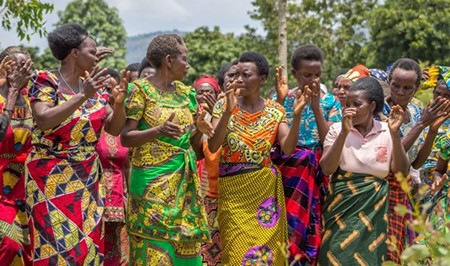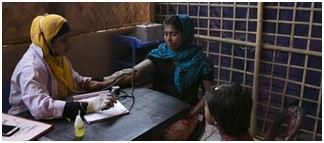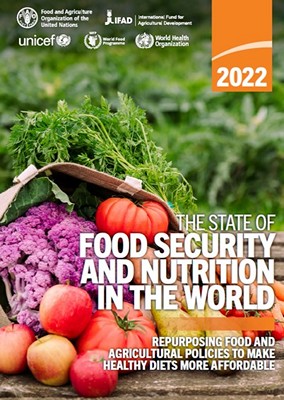Gender Transformative Universal Health Coverage for an Ageing World
Direct Link to Full 10-Page 2023 HelpAge Publication:
https://www.helpage.org/wp-content/uploads/2023/07/Achieving-gender-transformative-UHC.pdf

Copyright: HelpAge International
Universal health coverage (UHC) is defined as everyone, everywhere being able to access the health services they need without suffering financial hardship. Progress towards UHC is essential for promoting healthy ageing, delivering social and economic development, and building resilient and equitable societies that respond effectively in times of crisis – including pandemics, climate crisis or other threats to global health security. UHC also has a key role to play in achieving a more gender equal world.
The commitment of governments to achieve UHC within the Sustainable Development Goals aligns directly with their duty to respect, protect and fulfil people’s right to the highest attainable standard of physical and mental health. The Political Declaration on UHC agreed in 2019 also explicitly committed governments to scale up efforts to promote healthy ageing and to mainstream a gender perspective into UHC, with a view to achieving gender equality and the empowerment of women and girls through health policies and health systems delivery.
By 2030, 1.4 billion people will be aged 60 or over – the majority of whom will be female. Yet health and care systems worldwide remain unprepared for population ageing and associated increases in rates of non-communicable diseases (NCDs) and disability. Millions of older people globally are unable to access the health and care services they need, while critical opportunities for promoting healthy ageing and harnessing UHC’s potential to transform gender relations across the life-course are being missed.
An older world is a more female world
Women aged 50 and over account for over a quarter (27 per cent) of the world’s female population, yet they are almost entirely invisible in debates on gender equality globally.1 Ageing populations also mean more female populations, both in terms of total numbers and the proportion of women compared to men. Although men outnumber women until the age of 50, women outnumber men at older ages due to their longer life expectancies. By 2030, 54 per cent of the world’s 1.4 billion older people will be female, and 60 per cent of people aged 80 and over.
Women live longer than men but spend more of their lives in ill health or with a disability
Partly as a result of their longer life expectancy, women spend a greater proportion of their lives in ill health or with a disability (see table 1 below).
| Life expectancy at birth (years) | Healthy life expectancy (HALE) at birth (years) | Gap between HALE (years) | and LE | ||||||
| Location | Both sexes | Male | Female | Both sexes | Male | Female | Both sexes | Male | Female |
| (WHO) Global | 73.31 | 70.85 | 75.87 | 63.7 | 62.5 | 64.9 | 9.61 | 8.35 | 10.97 |
| Africa | 64.49 | 62.37 | 66.65 | 56 | 55 | 57.1 | 8.49 | 7.37 | 9.55 |
| Americas | 77.16 | 74.49 | 79.84 | 66.2 | 64.8 | 67.5 | 10.96 | 9.69 | 12.34 |
| South-East Asia | 71.44 | 69.88 | 73.1 | 61.5 | 61.1 | 61.9 | 9.94 | 8.78 | 11.20 |
| Europe | 78.24 | 75.09 | 81.29 | 68.3 | 66.6 | 70 | 9.94 | 8.49 | 11.29 |
| Eastern Mediterranean | 69.74 | 68.31 | 71.31 | 60.4 | 60.2 | 60.7 | 9.34 | 8.11 | 10.61 |
| Western Pacific | 77.66 | 74.76 | 80.83 | 68.6 | 67 | 70.2 | 9.06 | 7.76 | 10.63 |
Source: World health Organisation (WHO), Global Health Observatory: Life expectancy and healthy life expectancy (2019)
Извор: WUNRN – 28.09.2023



